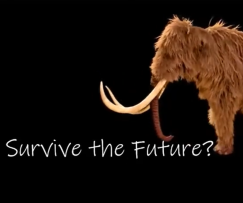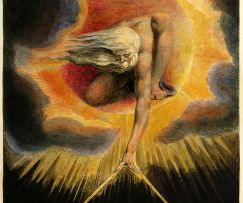Through hell and high water: how suffering is the power source of passion
Extract from Nondual Passion: A Quality of Consciousness in Nondual Therapy, by Georgi Y. Johnson.
So far, we have established that we are often distracted from passion by social pressure. We have shown how passion has become confused with mental agenda and the thinking mind; how we are indoctrinated into the “top-down” approach in which our brain is supposed to give direction, meaning, and purpose to experience. We also ventured into the whole area of quality complexes, where we pretend to be passionate in order to get a sense of passion, which often shows how much we miss and long for that spontaneous, choiceless fire of who we are at the experiential core.
In the previous chapter we looked at how the New Age fashion of manifesting our reality often falls short of fulfillment, forsaking both the reason and season of our brilliance in its need for immediate gratification. It misses the depth, truth, and wholeness of experience, due to its agenda to selectively keep the stuff that feels “good” and get rid of the stuff that feels “bad”.
Now, stepping beneath the divisive mechanics of the judgmental mind, we are going to explore passion. But to do this, we need to look deeply into the nature of experience, and especially into the nature of the vibration of experience we call suffering.
In the 13th century, the word suffering emerged, with the meaning: “allow to occur or continue, permit, tolerate, fail to prevent or suppress…” By the late 14th century, it already took on the meaning: “to undergo, be subject to, be affected by, experience; be acted on by an agent.” In short, the word suffering, in its origin, is synonymous with the word experience, especially the helplessness within experience.
Suffering in its purest sense is found here, right at the psychic junction between suffering and resistance (resistance, which as an experience can also be a form of suffering). In its original sense, to suffer something is to allow it. So, when we agree to suffer our own being here, there is a “yes” to life. Where there is resistance, or resistance toward the resistance, we are saying “no” to life, and forming conditions on our aliveness. Yet we are that life, before we say either yes or no to it. The life we suffer, or resist is the same life that suffers and resists. The splitting of life from life is another form of experience within the whole.
Both suffering and resistance are reflexes within the purity of helplessness. This helplessness is at the core of all experience. It is the pure openness that allows passion to emerge. The admission of helplessness can be the golden key to opening the mind, heart, and body. Helplessness brings the softening into the imperceivable power source of pure potential that allows the awakening of the passion for life.
When we resist something which is anyway happening, then we become victimized. The thing we resist gets externalized and we lose agency, suffering in a more dissipated form. The original resonance of suffering is still there, but we splinter it with the additional resonance of resistance. We do this by deflecting our consciousness, and then wonder why we feel deflected.
Our ability to suffer directly relates to our ability to experience anything at all. The less we are able to contain uncomfortable impressions and sensations, the more we shut down on experience in general.
The more we are able to suffer our lives, the greater is our empowerment and agency. The very agreement to suffer arises out of a depth of internal authority that precedes experience of any kind. By agreeing to allow the pain within experience, we affirm that we are at source not caught in the experience; we are not possessed by it nor are we defined by it. Experience is perpetually changing, but we remain. We are the perceptive space that watches and feels the ebb and flow of all impressions. This affirmation of our inner authority and spaciousness further increases our ability to freely allow experience. We relax still deeper into the permission to be physically alive, and then as we relax, the senses open. Colors become brighter, sounds become clearer, and we begin to taste, smell, and touch the world in fresh ways. As we move out of the fog of denial, we begin to come to life.
We are conditioned into a belief that our resistance proves our strength. We confuse resistance with resilience. But on examination, we can find that when we resist an aspect of experience, we lose power. Resilience is about adaptability, flexibility, and responsiveness to change. It’s not the rigidification of resistance.
When we believe that we need to resist something, we are investing in the belief in weakness. Something in us could be broken, so resistance is necessary. In this we give our power to that which we are resisting. What we resist, persists. We are no longer the subject which is the experiencer. Rather, we identify as the passive object that is being acted upon. We turn on our heels and go on the run, sometimes for so long that we forget what we are running from. This disempowerment, disenfranchisement, discrimination, disappointment, disgrace, distress, or distraction (just choose your “dis” word), further limits our ability to come to life.
To suffer, or to resist? Either way, there is a real psychological sense of destiny delayed. At worst, our resistance can obscure our consciousness so effectively that we lose connection with the very wellbeing we have been striving for, forgetting even that such wellbeing exists. It is a dualistic predicament described succinctly by Shakespeare’s Hamlet in the timeless soliloquy on the paradox of being alive:
“To be, or not to be, that is the question: Whether ’tis nobler in the mind to suffer the slings and arrows of outrageous fortune, or to take arms against a sea of troubles, and by opposing end them: to die, to sleep, no more; and by a sleep, to say we end the heart-ache, and the thousand natural shocks that flesh is heir to? ‘Tis a consummation devoutly to be wished. To die to sleep, to sleep, perchance to dream; Aye, there’s the rub, for in that sleep of death what dreams may come when we have shuffled off this mortal coil, must give us pause.”
Hamlet
Prolonged resistance is only possible through a reduction in sensitivity – a form of psychic sleep. Within this sleep, the same denied suffering emerges in dream-like form, still seeking release, only now it lacks physical context and appears as the ravings of a disturbed mind.
As long as all is pleasure, comfort and joy, experience is sweetly welcomed, we would think. Yet what happens over time is that when we repeatedly deny the sense of suffering, we begin to distrust all experience. Because experience is full of unwanted surprises and the only way we can control it is to deny its spontaneity and rehearse it, censor it, filter it, and dull the lights on it.
It’s simply not possible to take the suffering out of experience, but still, from season to season, without sense or reason, we try. The sense of love is tagged with future loss, so we lose the loving. We shun the sense of peace because we already know we’ll be shocked by conflict. We reject our innocence because our badness is a foregone conclusion. We shun our purity because who would want pure filth?
If we were made of the color blue, and the exact same color blue were to appear before us, would we even be able to sense it? How could we sense the temperature of the air if that temperature were precisely the same as our bodily heat? Experience is generated through the sensual stress of difference, through the vulnerability within variety, and through the shock of conflict. It all disturbs the peace. It rocks the stillness of the water. It is the light that arouses the spirits of the night and it casts shadows, everywhere. From one perspective, all experience is a kind of suffering. If we wish to experience life, we must be ready to suffer it. It is out of this readiness to come to life, that passion arises.
All our darkest nightmares and our wildest dreams are formed out of areas of conflict seeking resolution. These apparitions are externalized, appearing outwardly as “other” than us. Suffering is “ex”-perience, and experience is a core effect of creation. Creation is a manifestation of trial and error, driven by need, and in this, we are co-creators. As we experience, we experiment, and as we experiment, we learn, which is our evolution. We are hard-wired for this adventure.
That means that the whole world – whether it is our oyster or not – is made of the suffering that we spend much of our lives trying to avoid, at the same time that we try to ensure that it lasts forever, because endings hurt, loss is dreadful, and death is the ending we learned to believe in. Yet in this great evolutionary playing field, governed by multiplication and division, we have this free choice between suffering and resistance.
Resistance is all about buying more time and space, in order to preserve form so that experience can evolve. It gives us the means to temporarily slow the rate of change, and to process experience in digestible chunks. Yet when this natural resistance gets hijacked by fear which in turn finds danger in all forms of experience, whether deemed good or bad, we get into trouble. We lose our balance.
Every moment of creation is also a moment of destruction. When we create something new, we destroy the old. When we create an adult, we destroy the child. When we create a painting, we destroy the whiteness of the canvass. When we build a house, we tear into the earth, uproot trees, and disrupt the flight paths of birds. When we create a new human form, we also create a new human death. Endings are implicit to beginnings, just as every arrival already contains departure. The attempt to take the suffering out of life is like trying to take the wetness out of water. The only way we can avoid the wetness of water is by numbing the senses altogether.
Passion (n.) c. 1200, from Late Latin Passionem (nominative passio) “suffering, enduring,” from past-participle stem of Latin pati “to endure, undergo, experience…”
When our purpose is hijacked by an agenda to get only the comfort and not the discomfort, we become uncomfortably numb. This shows up as states of existential boredom and pointlessness (see Chapter 12). Resistance stiffens the limbs and slows the vitality in the body in a kind of existential passive aggression towards the experience of being alive.
The agenda to take the suffering out of experience breeds an exponential field of conflict and confusion around the original suffering. This is because impermanence is a key ingredient to every moment – including moments of bliss, beauty, ecstasy, and joy. And this impermanence brings loss, sadness, and grief. This is why the Buddhists refer to the suffering of impermanence – which is also, thankfully, the impermanence of suffering. Where we resist, we also resist the mercy of impermanence.
If we could take the grief out of our experience, we would also be paralyzing the timeless joy found in that which was lost. If we could remove the loss from our lives, we would also remove the gain. We would remove movement itself. If we could prevent the pain of parting, we would also prevent the passion of penetration. All depends on the underlying wholeness of experiential awareness in order to thrive. In the words of Khalil Gibran:
“Your joy is your sorrow unmasked.
And the selfsame well from which your laughter rises was oftentimes filled with your tears.
And how else can it be?
The deeper that sorrow carves into your being, the more joy you can contain.”
If we try to take the suffering out of the experience, we lose some of our capacity to experience anything at all. The formula of grief is found in the joy shared with the one that was lost. The key information in the pain of rejection is found in the sense of belonging. The very internal structure of boredom is the passion that has been frustrated.
And this is where it gets interesting. The word “suffering” is synonymous with the word “passion”. Passion is the raw flame of experience; the essence of suffering; the consciousness at the core of all manifestation. To pass is to step through, to move, or to permit. If to suffer is to allow experience to live in us, then passion is to permit the broadcast of that experience.
We can recall that the passage of suffering, crucifixion, and resurrection is traditionally called the Passion of Christ. In this circulation from heaven, to earth, to hell and to heaven, we are shown a natural circulation of form and transformation that is indigenous to the very nature of experience.
In suffering, we suffer our aliveness – we allow the varieties of experience to flavor our consciousness. In passion, we offer our inner world through a transformative process back to the whole – to be shared, expressed, and broadcast as part of our unified evolutionary purpose.
When we get hurt, there is vitality in it. The first cuts are the deepest. They are meaningful because they have a sense of truth about them. When we are hurt to the core, we feel our core. This centers us and brings a sense of purpose. When something cuts us to the quick, there is a quickening of vibration. We awaken to what is essential. This includes the timeless, existential core of ourselves found within our true nature. The deeper the wounding, the more \startling the opportunity for conscious awakening. Suffering is a catalyst for conscious awakening. It is a rude awakening, but it is an awakening of magnificent, healing proportions.












